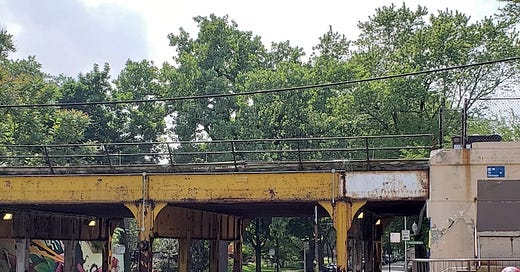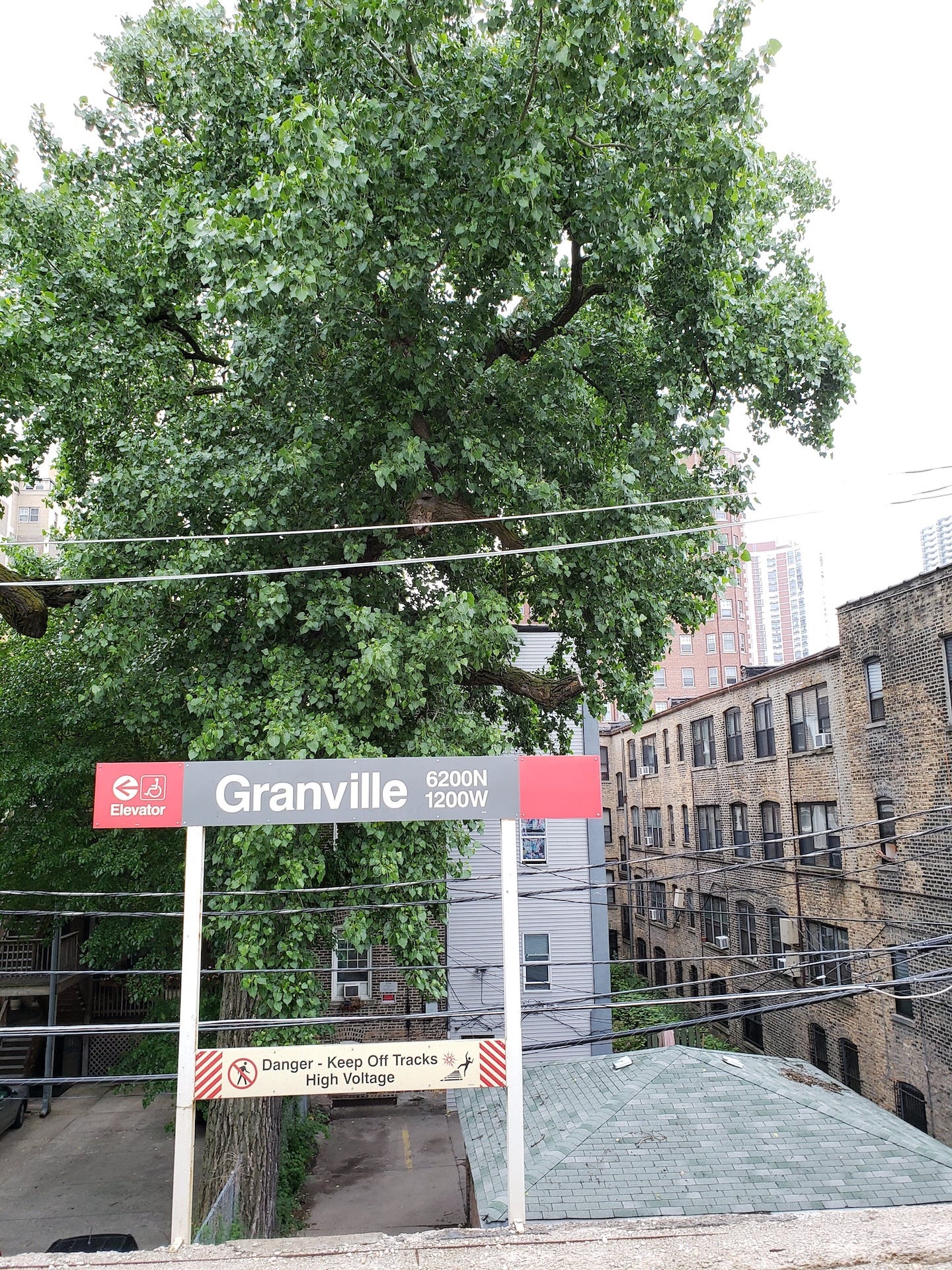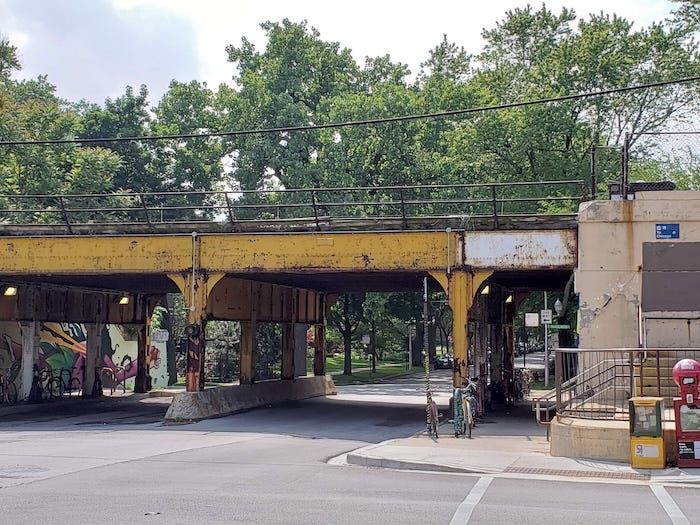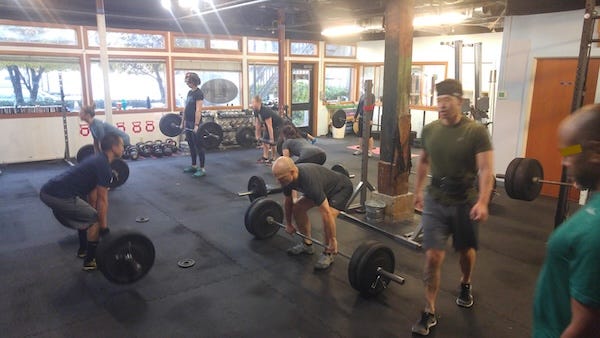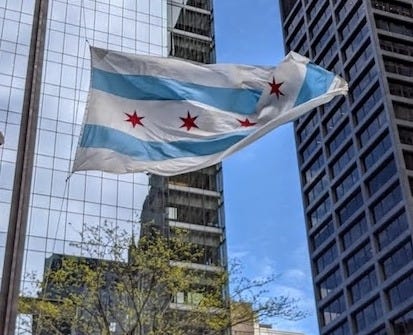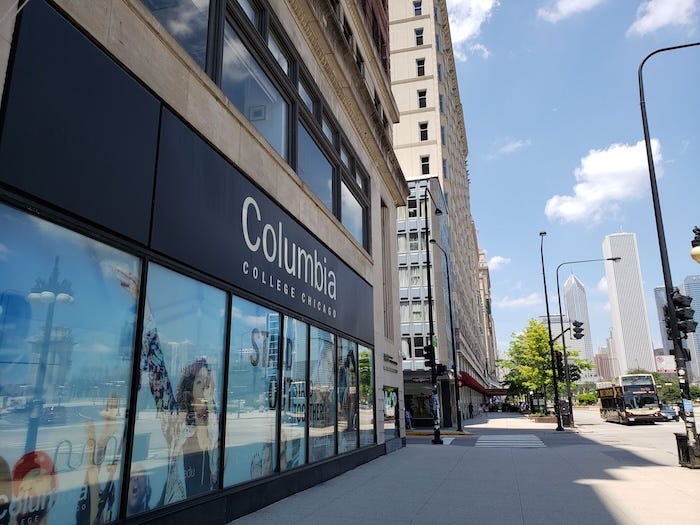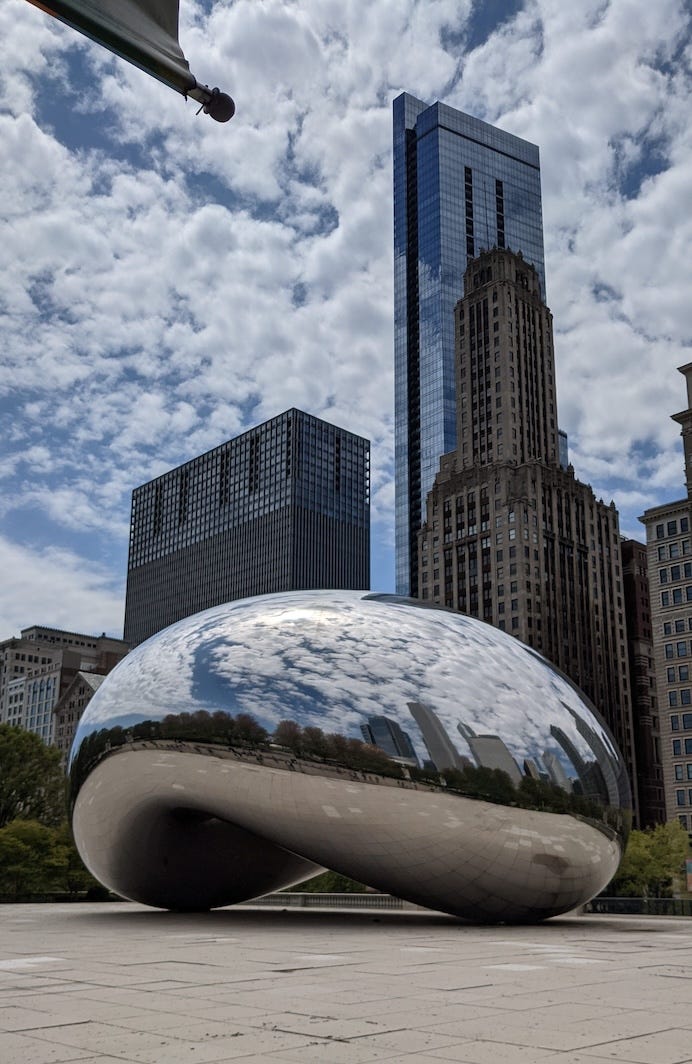I was an only child in Chicago in the 1970s. At age eleven, I lost my mother to cancer. This experience still reverberates, and it’s the theme and the background to my writing. My memoir follows a formerly confident young girl suddenly fragile and precarious. With luck and courage, she establishes solid ground through nature, journal writing, and friends of all ages. My Substack entries support my book-writing process.
When Tom and I planned our Illinois trip in June 2018, I was deep into the project of typing up all 60-ish of my journals. Pictures of Chicago—snapshots, Google Maps and Street View, real-estate listings—were triggering wave after wave of almost trippy emotions, vague but so intense. So I decided that after we visited our Lake County family (my beloved in-laws), I would spend some time in Chicago by myself. I wanted to bike around with my journal, submerge myself in emotion, and see what it would tell me. So I reserved four nights in an Airbnb in Edgewater, on Winthrop, not far from where I grew up in Rogers Park.
As soon as I stepped off the L (the train) onto the platform at Granville, I started taking pictures, staring around me at the backs of the brick apartments, their wooden back porches, and the big chunky cottonwood tree growing behind one of them.
The familiarity ached, and I wanted to melt into the ache. This kaleidoscope of feelings was a delicious torment, like touching a sunburn. I wrote in my journal a lot during that four days and then, it seems, processed it internally for six and a half years before this essay emerged.
My journal from that first night alone says something like this:
I feel alone, determined to express myself, afraid no one is interested, I feel silenced from long ago. I feel full of love of the flawed and the worn and the nonbeautiful. I feel tough. I feel full of longing, sad in a bittersweet way, wistful, homesick, nostalgic, inspired, creative. I feel pain and anguish, I feel the resilience that was almost exhausted at times, I feel energetic without outlet, I feel breathless with either anxiety or anticipation, and I feel long-ago loneliness, isolation, frustration, and vulnerability. (Is there a name for this? Haha.)
Do I really feel all of these feelings? Some are remembered feelings from determined years in brick buildings, lonely and fearing loneliness, wondering if I would ever really be loved for who I am when it seemed everyone (or just me?) wanted me to change. Between 1988 and 1995, I would walk to get lunch alone in the pretty suburb of Lincolnwood wondering if I was stupid to try to imagine “the ideal companion.”
Of course, at other times, I had lunch with coworkers who were friends, and we laughed a lot at work, and I commuted by bike, and I got my first car during those years. I wasn’t only a sad sack. I had a best friend and her family and I wasn’t as isolated as the emotions felt—but the emotions were real. Being in a long-term relationship with the wrong guy was maybe more lonely than I’d have been if I weren’t dating anyone. There’s no way to know what would have been if one thing had been changed.
Most of my emotions in my 20s were not shared because I didn't know how to share them, unless by dumping them on my best friend, or by acting them out (not constructive). My male partner didn't see the value in things I felt strongly about, like music, nature, and going to the Ozarks—we weren't compatible. Emotions weren’t convenient, and he was dismissive. I had to struggle against feeling that my interests were silly and trivial, along with so many things I dreamed of.
I made some big changes in my thirtieth year and then met Tom, who loves me for who I am and is the most generous person I’ve ever known. In the next 25 years, because of that, I grew into myself, and I focused on the present. My old journals were in a carton. There was no reason to take them out. I threw myself into passion projects and let my curiosity pull me along. Tom was always up for it.
Curiosity led me in my mid-50s, after closing my CrossFit gym, to type all of my journals (which start with me at age ten). They’d sagged untouched in their box, piled every which way, for twenty years. Reading them closely in chronological order, and typing them, was like turning on a light on a dark stage and seeing it full of actors—at last seeing the play I’d been involved in. My life’s turning points and hidden personal trends popped into view. Learning how my own inner life has worked to power my outer life is my most compelling project, for going on seven years now.
Okay, so in 2018 I had four days in Chicago all to myself.
On the afternoon I arrived, I rented a Divvy Bike (bikeshare) on a day pass and biked around the North Side until almost dark, stopping often to just look and think. The building on whose lawn my mom made a flower garden; the railroad tracks where my earliest friend and I hunted for caterpillars; the big stairstep “rocks” on the lakeshore where I remember being on my mom’s bike with her at age five; the entire lakefront bike path. Feelings washed through me: Mystery, comfort, excitement and discovery, love, trust. I felt like I could almost step back in time.
The buildings where friends lived who have been gone for decades, and even our old house on Columbia Ave., seemed almost ready to open their doors: a warm feeling of longing, frustration at the immediacy of the irretrievable.
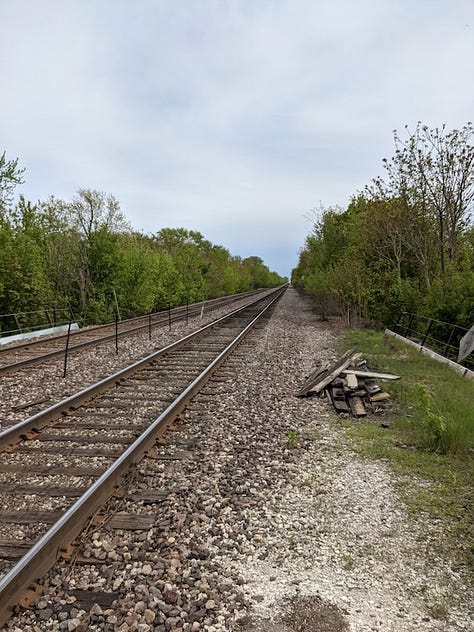
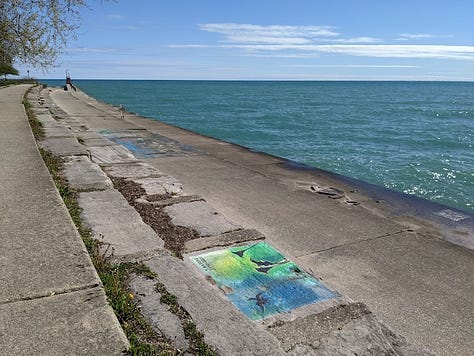
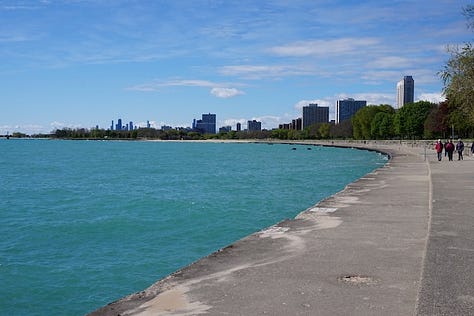
During these four days, while making the most of time alone, I also met up with five people individually: my closest cousin, my mom’s best friend, two former coworkers from two jobs, and my college girlfriend and friend R.
R and I, living on opposite coasts, hadn’t seen each other in person in thirteen years, as far as I can figure out by consulting my personal encyclopedia my journals. We met up on this occasion in Rogers Park, near the beach, near the apartment we’d shared in the mid-80s.
Then we took the L downtown to shop in the bookstore at the small college where we’d studied art and writing.
We came out of the bookstore and walked west alongside the Harrison Street building. An androgynous young woman passed us on the sidewalk, wearing a tattered, markered denim jacket and almost a buzz cut.
I looked at R. "That was us!" she said, in a stage whisper. Us, circa 1986.
I'd been thinking the same thing. In the moment, I still felt like a young short-haired tomboy who looked great in sex-indeterminate secondhand clothes. My self image is full of layers, like that girl’s outfit. So is every generation’s exploration of edgy looks, each wave of kids thinking they invented it. They are still wearing the black-and-white checked Vans that R had in 1985.
While we lived together and were in college, R’s emotions and views carried such intensity that I tried to stifle mine. After college, though, we split up and rebuilt a friendship and the intensity of her vision felt like a source of creative inspiration. It always took time for us to calibrate and match each other's energy, but then our phone conversations and our rare meet-ups were as satisfying as the talks we had when we first knew each other. We’ve only met in person about fifteen times since 1988.
On another day in Chicago I met up with my friend M. She and I met at work at a law firm where I worked the swing shift as a proofreader, and M was a night word processor—5:30 PM to 12:30 AM. I commuted by subway or rode my bike, which I had to lock up to a parking meter on the sidewalk. I took a night job because R had done so, at a different firm, shortly before we separated. Day and night word processing and proofreading departments were common at the big firms then. M and I were working for the bad guys: my job was to proofread deposition transcripts, followed by memos in which malpractice-defense attorneys laid out how to disparage the plaintiff and his/her witnesses for the jury.
This firm was high up in the Sears Tower, whose vast lobby was white and retro-futuristic. I had to take two elevators to get to floor 64. I think M and I became friends because among the dozen or so women in the Word Processing department, we were the ones without husbands and kids. M, an artist, lived alone in Pilsen close to downtown, working nights so that she could paint during the day.
I admired that. I lived alone, too, and moped a lot and slept too much. I remember the months I worked at that firm as if it were dark out all the time. I missed far-away R, and M empathized. She seemed to find me fun to be with even though I was feeling so lost.
When I met up with her in 2018, that was the final time I got to see her husband. They’d been dating when we worked together, and he passed away a few years ago. I don't think he even knew he was ill in 2018.
After about fifteen months as a night proofreader, I got a better job—what did the ads call a job that wasn't a dead end—a job with growth potential? something like that—at a small publisher of dental trade magazines. The few entry-level jobs there were full of variety, and the staff of about 40 people felt like a family. I worked as an admin to the publisher at first, then as temporary receptionist, then as an ad-sales and paste-up assistant, then as an editorial assistant, then as a desktop publishing ... technician? I can't remember what that was called. We used QuarkXpress—brand-new tech—on Apple computers and I really liked learning that.
I worked at the magazine publisher for almost seven years, and that’s where I met H. I got to see her in Chicago in 2018, too, for part of an afternoon. She is ten years older than I am, and when we became friends I was in my twenties. I latched on to her specialness within just a couple of weeks of knowing her. Any time we socialized outside of work—Rollerblading during lunch hour or going to her "health club" to sit in the steam room—I felt like I'd won the lottery. She was a generous and empathetic listener, and I needed that badly. She heard all about the never-ending turmoil of the wrong boyfriend.
G was special, but some of that special glow was projected by me, as my invisible spotlight landed on her and saw a mom figure. Among the people I've "motherized," she's one who kind of had superficial features in common with my mom, as well as a particular quality of attention. G has short curly hair and a wide face and wide smile, slightly similar but not that similar to my mom's. I'm sure my subconscious absorbed her familiar appearance, along with her kindness, as part of her overall warm-sunshine effect. (I wasn’t conscious, until typing my journals, that I’d used her as a mom figure or that she slightly facially resembled my mom.)
I also visited my mom's best friend in West Rogers Park in 2018. I'm so glad I got to see her then, because she soon moved far away to live with her daughter and I don't know if I'll get to see her again. After my mom’s death, this friend would have nurtured me like another daughter, if I had thought at age eleven that such a thing was possible. She helped me a lot by giving me lunch every day for a while, and by taking me shopping occasionally for stuff I needed, like a skirt for the horrifying seventh-grade school dances. But I couldn’t lean into her mothering. My task, as I saw it, was to acclimate to my aloneness. Unreasonably, and only through child logic, I saw my mom’s friend and her family as a yardstick I didn’t measure up to. I wish I had not felt that way—I know they loved me. It has always been so good to see her when I've had the chance.
And I saw my cousin, another M, the cousin who is closest to my age. We work together on genealogy and even took a research trip into southern Arkansas in 2013. We met up at the Art Institute in 2018 and admired the Pointillists and the Frank Lloyd Wright corner until we got tired, then went to sit in Grant Park.
A guy walked up to us. "We're looking for the Chicago Bean. Do you know where it is?" He meant, of course, Anish Kapoor’s beloved and so-perfect for its setting Cloud Gate (2006), which to me will always seem new. It was close by.
As a kid, I hated Chicago and didn’t want to live there—I wished I could go live in the country, where my late mom came from, because I identified with her so strongly. Later, I took for granted that Chicago didn’t belong to me, but to the career strivers we used to call yuppies, like those lawyers I worked for. Later still, I projected that I was excluded by the type of guys who bellow in Facebook groups about how they ate at the Billy Goat before Belushi ever heard of it. I thought I was by definition—mine and others’—an outsider.
I was sailing up Lincoln Avenue on a Divvy Bike when I realized what all the solo-Chicago emotions meant: Chicago is my city. When I got on that bike in June 2018 and took off as if I’d never moved away, it seemed I could see the map of the whole North Side in my head—as if I owned it. I appreciated, all of a sudden, that I had spent 32 years in Chicago learning my way around on the L and on my bike. I could, and did, and still can, get just about anywhere on those two modes of transport.
In college, talking about an essay of mine called “How to Commute by Bike,” my writing teacher said, “Riding all over Chicago on a bicycle, that’s not child’s play.” He was encouraging me to write with the assertiveness of an expert. I took it in as one of the best compliments I’ve ever received. The fact that I still remember it says it’s still meaningful.
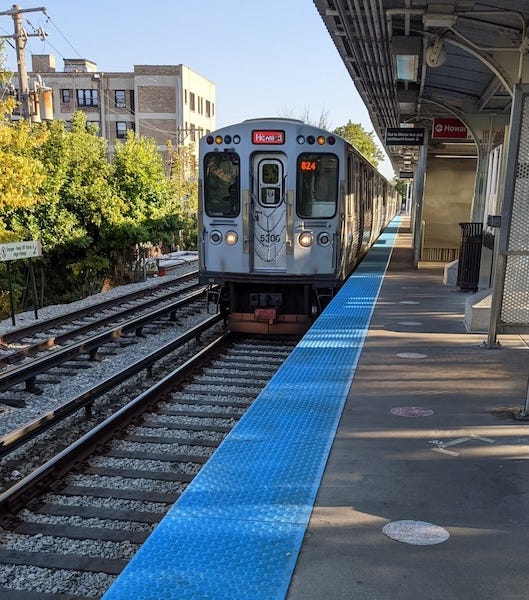
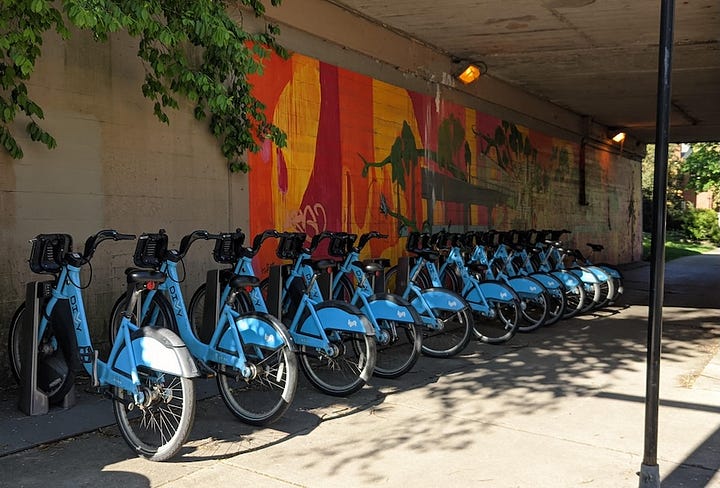
Chicago is not only a noisy background where I sheltered and protected myself, and then shrank myself to try to be loved. It’s also where I moved out of the house and paid my own bills and never looked back. It’s where Tom and I got together and launched ourselves two thousand miles and yet still love to go back because we can feel at home and have fun. I see Chicago now as a desirable place, a destination where I’m lucky enough to feel that “this is mine” and fortunate enough to have left because I wanted to live elsewhere.
I came out of a fitness client’s house here in Seattle last week, wearing a hoodie that has a Chicago flag on it. A young guy was passing by on the sidewalk and he wheeled around to talk to me.
“Are you from Chicago?”
“Yes.”
“Oh my God! I just lived there for like three years!”
“I’m from Rogers Park!”
“Oh my God! The best neighborhood!”
“I know! If we ever moved back, that’s where I’d go!”
“Do you go back?”
“Yes! I love to rent a Divvy Bike and ride all over the north side!”
“Ooh!”
###
If you read this whole thing, THANK YOU! Let me know your thoughts in the comments.

